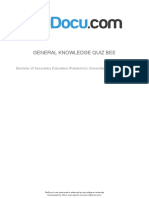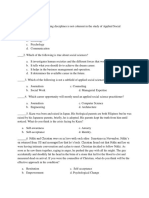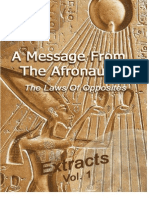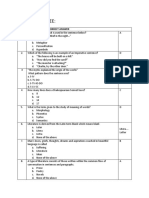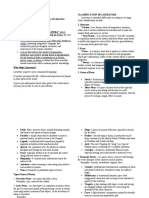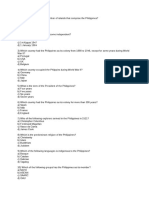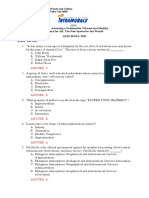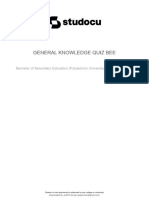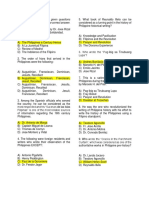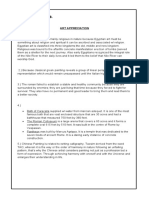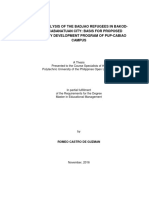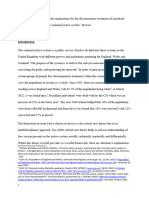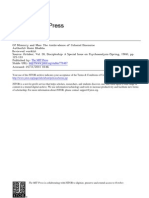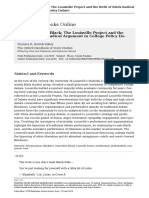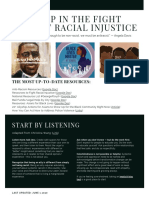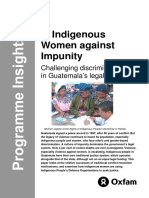SOCIAL SCIENCES Quiz Bee 2019
SOCIAL SCIENCES Quiz Bee 2019
Uploaded by
Romeo Castro De GuzmanCopyright:
Available Formats
SOCIAL SCIENCES Quiz Bee 2019
SOCIAL SCIENCES Quiz Bee 2019
Uploaded by
Romeo Castro De GuzmanOriginal Title
Copyright
Available Formats
Share this document
Did you find this document useful?
Is this content inappropriate?
Copyright:
Available Formats
SOCIAL SCIENCES Quiz Bee 2019
SOCIAL SCIENCES Quiz Bee 2019
Uploaded by
Romeo Castro De GuzmanCopyright:
Available Formats
EASY Questions: (1 POINT)
Direction: Analyze carefully each item. Choose the letter of the best answer in each item.
1. Which is the most acceptable statement about religion?
A. Religion postulates magic.
B. Religious teach people about power.
C. Most religions assume that the world is filled with bad spirits.
D. Through religion, people create meaning, peace of mind and social solidarity.
2. The past and at the present is the domain of __________.
A. Archaeology
B. Anthropology
C. Ethnography
D. Linguistics
3. The following is necessary for peace to be attained except:
A. Capitalism
B. Democracy
C. Human Rights
D. Human Security
4. All are specific rights of children except:
A. right to go to school
B. right to play
C. right to health care
D. right to work
5. Rights recognized by laws.
A. Natural
B. Legal
C. Collective
D. Individual
6. Peace is defined as:
A. inner stillness
B. conflict
C. harmony
D. cooperation
7. Internationally, any person below 18 is considered a:
A. minor
B. child
C. adult
D. voter
8. The most radical and far-reaching kind of change is:
A. evolution
B. invention
C. revolution
D. diffusion
9. The question “How to raise the standard of living of people?” is synonymous to:
A. How to raise the income of people?
B. How to raise our ability to produce goods and services?
C. What should be the form of government?
D. How do we distribute goods and services?
10. The Agency responsible for the macroeconomic planning and crafting economic policy and
direction in the country is the:
A. Department of Trade and Industry
B. Department of Finance
C. National Economic and Development Authority
D. Bangko Sentral ng Pilipinas
AVERAGE Questions: (2 POINTS)
1. The direct and explicit study of meanings and perceptions of people through language is the
domain of ______. LINGUISTIC/S
2. What characteristic of research is shown when it follows specific steps or processes so that
questions will be answered? SYSTEMATIC
3. An increase in the economy’s stock of physical productive capital is called ____.
INVESTMENT
4. Two or more people related by blood, marriage or adoption. FAMILY
5. A Greek philosopher who introduced empirical knowledge by use of observation to explain
universal truths. SOCRATES
6. The systematic explanation of observed phenomena drawn from social manifestation or
patterns in social life. THEORY
7. Legislations granting special privileges to senior citizens help to neutralize prejudice and
discrimination toward a social category based on ____. AGE
8. Persistent nepotism in our society is generally explained as repayment to family members of
a debt of gratitude which to Filipinos is termed. UTANG NA LOOB
9. It is the value marker conveyed by the EDSA people power revolution. FREEDOM
10. The value of all goods and services produced by a country in a given period. GROSS
NATIONAL PRODUCT / GNP
DIFFICULT Questions: (3 POINTS)
1. Stereotyping, prejudice, and racism is a result of ________. ETHNOCENTRISM
2. It is something made or given shape by humans, such as a tool or a work of art, especially an
object of archaeological interest. The beginning of human beings can also be traced.
ARTIFACTS
3. The first African president of South Africa and leader of the African National Congress who
fought for the abolition of apartheid in his country. NELSON MANDELA
4. It is an organized system of ideas about the spiritual sphere or the supernatural. RELIGION
5. Temporary groupings of people in close proximity who share a common focus or interest.
CROWDS
6. A massive culture changes that people are forced to make as a consequence of an intensive
firsthand contact between their own group and another. ACCULTURATION
7. A body of rules emanating from government institution and enforceable by the courts. LAW
8. A form of government where the power of the state is divided into national for national affairs
and local for local affairs. FEDERAL
9. In ancient times, it was Asia which was referred to as the seat of civilization. During the
middle ages, this continent became the center of social, political, economic and religious
development. EUROPE
10. It is an issue of socio-economic-political underdevelopment. TERRORISM
CLINCHER Questions:
1. Which could not possibly be an important concept in the knowledge of peace?
a. globalization
b. conflict and war
c. responsible leadership
d. non-violence
2. Violation of human rights is a violation of the _______ of the person.
a. freedom
b. dignity
c. intelligence
d. emotions
3. With the promotion of social justice, which does not belong to the group?
a. profit sharing
b. diffusion of wealth
c. equitable access to education
d. absolute right over property
3. What do we call those people who are for the “revival of the classics” in social trends?
a. reformists
b. humanists
c. existentialists
d. rationalists
4. What is an environmental law which requires industries to install anti-pollution devices and
bans the use of incinerators?
a. Greenpeace Act
b. Anti-Pollution Act
c. Environmental Security Act
d. Clean Air Act
5. What kind of prejudice has been overcome in the Philippines in the inclusion of the Muslim
holidays that have gained national respect, aside from the Catholic holidays like Christmas,
Lenten Season, etc.?
a. heterosexualism
b. religious intolerance
c. sexism
d. looksism
6. The most basic right to form a family is _______.
a. civil right
b. human right
c. religious right
d. legal right
7. What is the Anti-Graft and Corrupt Practices Act?
a. RA 1013
b. RA 3019
c. RA 2015
d. RA 2143
8. To help global climate change, and live a more eco-friendly life, which is the best practice that
uses less water in washing plates?
a. recycling water
b. washing by hand
c. using a dishwasher
d. using a pail
9. What is the biggest reason why the Philippines’ political system is so flawed, with political
power vested in the hands of a few families?
a. sibling rivalry
b. indigenous group
c. tribe
d. dynasty
10. What program promised more food for every household through planting of vegetable in
home gardens and pots?
a. Angat Filipino Movement
b. Go Negosyo
c. Kilusang Kabuhayan at Kaunlaran
d. Green Revolution
You might also like
- Game Ka Na Ba QuestionsDocument5 pagesGame Ka Na Ba QuestionsMarco Cervantes100% (2)
- Reviewer For PnuatDocument10 pagesReviewer For PnuatShaiNo ratings yet
- General Knowledge Quiz BeeDocument5 pagesGeneral Knowledge Quiz Beejean Apostol100% (3)
- 250 Questions With Answers Social Sciences MajorDocument17 pages250 Questions With Answers Social Sciences MajorBryan Aguila Bautista100% (5)
- General Knowledge Quiz Questions & Answers - General KnowledgeDocument12 pagesGeneral Knowledge Quiz Questions & Answers - General KnowledgeWaqasskhan100% (5)
- UP PautakanDocument10 pagesUP PautakanTrisha Rodriguez100% (2)
- Social Science ReviewerDocument8 pagesSocial Science ReviewerCjay Maningas90% (10)
- Message From The Afronauts Vol 1 - 20Document402 pagesMessage From The Afronauts Vol 1 - 20matsieng100% (4)
- Filipino Trivia QuizDocument15 pagesFilipino Trivia QuizJohnny Abad100% (2)
- General Information Quiz BeeDocument48 pagesGeneral Information Quiz BeeInvincibleReine100% (3)
- Literary Quiz BeeDocument4 pagesLiterary Quiz BeeMinnie Delos Santos100% (7)
- Quiz Bowl QuestionsDocument8 pagesQuiz Bowl QuestionsKeenan Dave RivoNo ratings yet
- Philippine Literature ReviewerDocument25 pagesPhilippine Literature ReviewerDhel Delima ZaraNo ratings yet
- Asian History Questions and AnswersDocument4 pagesAsian History Questions and AnswersJessie J.100% (6)
- English Quiz Bee ReviewerDocument4 pagesEnglish Quiz Bee ReviewerJoshua Apilado60% (5)
- 100 Interesting Facts About The Philippine PresidentsDocument15 pages100 Interesting Facts About The Philippine PresidentsJanneka Buen50% (2)
- General Education Quiz Bee: QuestionnaireDocument3 pagesGeneral Education Quiz Bee: QuestionnaireMarione John Marasigan100% (1)
- Science History QuizDocument30 pagesScience History Quizlizbet08100% (1)
- Battle of The Brains QuestionsDocument11 pagesBattle of The Brains QuestionsJohn VerNo ratings yet
- Philippine Politics and GovernanceDocument25 pagesPhilippine Politics and GovernanceAndres BoniNo ratings yet
- Eagle QuizDocument5 pagesEagle QuizJayson Sillar100% (3)
- Quiz BeeDocument32 pagesQuiz BeeMon Doce100% (3)
- MODULE 5 - DISS - Interpretive Social ScienceDocument7 pagesMODULE 5 - DISS - Interpretive Social Sciencekimberson alacyang100% (1)
- (Re-) Defining Racism: A Philosophical AnalysisDocument423 pages(Re-) Defining Racism: A Philosophical AnalysisParintins ParintinsNo ratings yet
- Social Sciences Quiz Bee 2019: Easy Round 1 Point Average Round 2 Points Difficult Round 3 Points Clincher RoundDocument45 pagesSocial Sciences Quiz Bee 2019: Easy Round 1 Point Average Round 2 Points Difficult Round 3 Points Clincher RoundRomeo Castro De Guzman100% (1)
- World History ReviewerDocument13 pagesWorld History ReviewerJames Walter Pastrana100% (1)
- ChE Quiz Bowl 2019Document6 pagesChE Quiz Bowl 2019Ana Marie Allam100% (2)
- Social Studies Quiz Bee 2020: October 30, 2020 1:00 PMDocument102 pagesSocial Studies Quiz Bee 2020: October 30, 2020 1:00 PMAllan AñonuevoNo ratings yet
- Current Events & General InformationDocument4 pagesCurrent Events & General InformationCharlie PeinNo ratings yet
- Current Events QuizDocument3 pagesCurrent Events QuizKarla Rosselle Baesa-Torres100% (1)
- Battle of The Brains ReviewerDocument3 pagesBattle of The Brains Reviewermayonaissedelight smoothieNo ratings yet
- Quiz BowlDocument9 pagesQuiz BowlWinstonEnriquezFernandezNo ratings yet
- Shs English Quiz BeeDocument83 pagesShs English Quiz BeeMarvin Diadula100% (1)
- Quiz Bee Questions: (History, Culture, Government & Constitution) Level 1Document5 pagesQuiz Bee Questions: (History, Culture, Government & Constitution) Level 1Alvic Torres100% (4)
- Philippines Quiz QuestionsDocument5 pagesPhilippines Quiz QuestionsRachel Macanas Fabilane-Dela PeñaNo ratings yet
- Tourism Quiz Bee ReviewerDocument8 pagesTourism Quiz Bee ReviewerClorinda Rodriguez100% (2)
- Intramurals Quiz Bowl 2022Document3 pagesIntramurals Quiz Bowl 2022Mary Grace UlgasanNo ratings yet
- Battle of The Brains QuestionsDocument5 pagesBattle of The Brains QuestionsMary Ann R. MoraNo ratings yet
- General Information Quiz Reviewer: Rainforest and RiverDocument8 pagesGeneral Information Quiz Reviewer: Rainforest and RiveranneNo ratings yet
- Midterm Exam Philippine PoliticsDocument3 pagesMidterm Exam Philippine PoliticsJonathan GubantesNo ratings yet
- General Knowledge Quiz BeeDocument5 pagesGeneral Knowledge Quiz Beejudith patnaan100% (1)
- Quiz Bee QuestionsDocument17 pagesQuiz Bee QuestionsDivina Gracia Barrion CuyaNo ratings yet
- Social ThinkersDocument1 pageSocial ThinkersHasmer Maulana Amal86% (14)
- Philippine Literature QuizDocument3 pagesPhilippine Literature QuizLyn PalmianoNo ratings yet
- National Hero Quiz BeeDocument56 pagesNational Hero Quiz BeeAhrts Quintana Dela Cruz100% (3)
- EditedFINAL QUIZBEE QUESTIONSDocument6 pagesEditedFINAL QUIZBEE QUESTIONSMyka Francisco100% (1)
- PPG - Module 2 - 2ND Sem - 2ND Quarter - Grade 11 - Humss Bonifacio-Agoncillo - MR - Paombong - MRS CuencaDocument12 pagesPPG - Module 2 - 2ND Sem - 2ND Quarter - Grade 11 - Humss Bonifacio-Agoncillo - MR - Paombong - MRS CuencaArnold Paombong100% (1)
- Philippine History QuestionsDocument12 pagesPhilippine History QuestionsSarah Jane ProtacioNo ratings yet
- Philippine Politics and Governance QuizDocument29 pagesPhilippine Politics and Governance QuizAiza San Pedro Santos100% (3)
- First Quarter Test - PPG 11Document4 pagesFirst Quarter Test - PPG 11VIRGILIO JR FABI100% (2)
- SHS Math Quiz Bee ReviewerDocument1 pageSHS Math Quiz Bee ReviewerRhanel Rhap P. ErdaoNo ratings yet
- Name: - Score: - Asian Studies I. MULTIPLE CHOICE: Blacken The Circle That Corresponds To The Letter of The Best AnswerDocument5 pagesName: - Score: - Asian Studies I. MULTIPLE CHOICE: Blacken The Circle That Corresponds To The Letter of The Best AnswerMicahCastro100% (1)
- Latest Social Science Reviewer Part 23Document6 pagesLatest Social Science Reviewer Part 23Mi Cah100% (5)
- Current Events QuizDocument4 pagesCurrent Events QuizMariz Natividad Gappe-Rivas0% (1)
- Diss ReviewerDocument3 pagesDiss ReviewerMargaret GesmundoNo ratings yet
- Final Exam Social ScienceDocument2 pagesFinal Exam Social ScienceSheally Talisaysay100% (1)
- Midterm Exam in PPGDocument2 pagesMidterm Exam in PPGMarisol Policarpio100% (3)
- Grade 11 Exam in World Religion and Belief SystemsDocument11 pagesGrade 11 Exam in World Religion and Belief SystemsGiancarla Maria Lorenzo Dingle100% (3)
- Prelim Exam in PhilosophyDocument2 pagesPrelim Exam in PhilosophyJhanay Jam Calzada0% (1)
- Readings in Philippine History - PretestDocument43 pagesReadings in Philippine History - PretestMartin Dave Enopequis100% (1)
- General Knowledge Quiz QuestionDocument1 pageGeneral Knowledge Quiz QuestionJustinCarlBelloNo ratings yet
- ST1 Activity 2 Set B Gen - EdDocument11 pagesST1 Activity 2 Set B Gen - EdRj MabalatanNo ratings yet
- Polytechnic University of The Philippines 115 Founding Anniversary Academic Contests CommitteeDocument2 pagesPolytechnic University of The Philippines 115 Founding Anniversary Academic Contests CommitteeRomeo Castro De GuzmanNo ratings yet
- Science Quiz BeeDocument1 pageScience Quiz BeeRomeo Castro De Guzman100% (1)
- Questionnaires Pol. Gov With AnswerDocument2 pagesQuestionnaires Pol. Gov With AnswerRomeo Castro De GuzmanNo ratings yet
- GROUP IV Early Christian ArtsDocument18 pagesGROUP IV Early Christian ArtsRomeo Castro De GuzmanNo ratings yet
- Rizal's Second Sojourn in Paris and The Universal Exposition of 1889Document61 pagesRizal's Second Sojourn in Paris and The Universal Exposition of 1889Romeo Castro De Guzman70% (10)
- RealismDocument13 pagesRealismRomeo Castro De GuzmanNo ratings yet
- Final Exam Politics BDocument5 pagesFinal Exam Politics BRomeo Castro De GuzmanNo ratings yet
- Soliman, Regine B.: BEED 1-1 Art AppreciationDocument2 pagesSoliman, Regine B.: BEED 1-1 Art AppreciationRomeo Castro De GuzmanNo ratings yet
- Needs Analysis of The Badjao Refugees in Bakod-AbstractDocument4 pagesNeeds Analysis of The Badjao Refugees in Bakod-AbstractRomeo Castro De GuzmanNo ratings yet
- Mills - White Time PDFDocument16 pagesMills - White Time PDFCedric ZhouNo ratings yet
- As2 CJRR 2023Document9 pagesAs2 CJRR 2023mbennadi11No ratings yet
- SSC 239G Race, Racism, and Anti-Racism in North American Society Major Assignment GuidelinesDocument4 pagesSSC 239G Race, Racism, and Anti-Racism in North American Society Major Assignment Guidelinesn2yszfqhz9No ratings yet
- Biopolitics in Central and Eastern Europe in The 20Th CenturyDocument276 pagesBiopolitics in Central and Eastern Europe in The 20Th CenturyJinga MiaNo ratings yet
- Air of Fredoom - Infinity History of Corruption in BoliviaDocument315 pagesAir of Fredoom - Infinity History of Corruption in BoliviaParavicoNo ratings yet
- Prejudice!: A Theme Exploration For The Merchant of VeniceDocument16 pagesPrejudice!: A Theme Exploration For The Merchant of VeniceFaizan NaeemNo ratings yet
- Homi Bhabha On MimicryDocument10 pagesHomi Bhabha On MimicryNoizee MNo ratings yet
- Annotated Bibliography - Chidi 4 ReviewedDocument5 pagesAnnotated Bibliography - Chidi 4 Reviewedapi-381539101No ratings yet
- How Free Were Blacks in The NorthDocument1 pageHow Free Were Blacks in The Northapi-302100530No ratings yet
- Third Document Commanderinchiefwhitehousepresidentoftheunitedstatesofamericapresidentbarackh - ObamaDocument9 pagesThird Document Commanderinchiefwhitehousepresidentoftheunitedstatesofamericapresidentbarackh - ObamaThomas MuloniNo ratings yet
- Marisol de La Cadena - Indigenous CosmopoliticsDocument37 pagesMarisol de La Cadena - Indigenous CosmopoliticsJosé RagasNo ratings yet
- Aihwa ONG PDFDocument27 pagesAihwa ONG PDFElihernandezNo ratings yet
- Anger Over Racist Chinese AdvertDocument4 pagesAnger Over Racist Chinese Advertlarry14_grace1231No ratings yet
- 2011.11.30 - Report - Media Representation and Impact On The Lives of Black Men and Boys - FINAL PDFDocument47 pages2011.11.30 - Report - Media Representation and Impact On The Lives of Black Men and Boys - FINAL PDFannieNo ratings yet
- Afro AsiaDocument416 pagesAfro AsiaHasriadi Ary MasalamNo ratings yet
- Racism in Black and White: A Bicultural Model of Reaction and EvolutionDocument2 pagesRacism in Black and White: A Bicultural Model of Reaction and EvolutionBryan Felipe MuñozNo ratings yet
- Guide To Becoming A White AccompliceDocument13 pagesGuide To Becoming A White AccompliceKelly Husted100% (3)
- Metaphor in Professional CounselingDocument13 pagesMetaphor in Professional CounselingS Almasy AliNo ratings yet
- Reid-Brinkley - Voice Dipped in BlackDocument21 pagesReid-Brinkley - Voice Dipped in Blackdocbrown85100% (1)
- Allyship in The Fight Against Racial Injustice: Start by ListeningDocument3 pagesAllyship in The Fight Against Racial Injustice: Start by ListeningDiana LinNo ratings yet
- RaaaDocument57 pagesRaaathenambikaNo ratings yet
- Indigenous Women Against Impunity: Challenging Discrimination in Guatemala's Legal SystemDocument13 pagesIndigenous Women Against Impunity: Challenging Discrimination in Guatemala's Legal SystemOxfamNo ratings yet
- 2019 Abduljabbar DAPh DDocument300 pages2019 Abduljabbar DAPh DMohamed AchemlalNo ratings yet
- 68IJELS 101202035 TheMyth PDFDocument13 pages68IJELS 101202035 TheMyth PDFIJELS Research JournalNo ratings yet
- Smit Partiality JamesDocument11 pagesSmit Partiality Jamesptralejo100% (1)
- Black Grace-Redemption of Benjamin ButtonDocument11 pagesBlack Grace-Redemption of Benjamin ButtoncodyNo ratings yet
- Cultural Competence Self-Assessment Checklist: Central Vancouver Island Multicultural SocietyDocument14 pagesCultural Competence Self-Assessment Checklist: Central Vancouver Island Multicultural Societyapi-468174354100% (1)
- Philip Kan Gotanda - The Chronicler of The Asian American ExperienceDocument10 pagesPhilip Kan Gotanda - The Chronicler of The Asian American ExperienceIJELS Research JournalNo ratings yet


